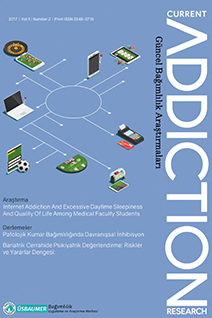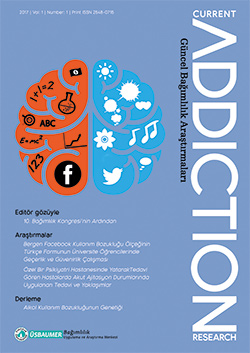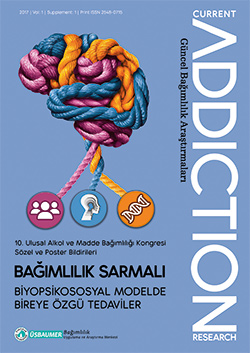ARTICLES
Original Article
İrem Teke Bulut,Ceylan Ergül Arslan
2024, 8(1), s:34-44
Objective: In this study, it was aimed to Decipher the relationship between the emotion regulation difficulty levels and psychological well-being levels of individuals who use tobacco.
Method: The study group of this study was composed of people between the ages of 18-65 Dec. The research data were collected by reaching 212 people virtually through a survey. The data were sent to the participants online with the ‘Sociodemographic Information Form’ prepared by the researcher, the ‘Emotion Regulation Difficulty Scale’ (DERS) and the ‘Psychological Well-Being Scale’ (PWB) scales and they were asked to answer and the answers were evaluated and collected.
Results: Within the scope of the study, the data of 212 participants who smoked were examined. The sociodemographic variables of the participants were compared with their emotion regulation difficulties and psychological well-being levels. In addition, the relationship between emotion regulation difficulties and psychological well-being levels of smokers was examined. According to the findings obtained in the study, significant differences were found in the scores of psychological well-being and difficulties in emotion regulation in terms of gender, marital status, employment status, income level, psychological disorder, presence of a smoker in the family, reason for smoking.
Conclusion: In addition, a negative, moderate and significant relationship was found between psychological well-being and difficulty in regulating emotion in smokers. The total score of emotion regulation difficulty predicts psychological well-being scores negatively and significantly. The model explains the variance by 14%. According to the findings regarding the prediction of psychological well-being scores by sub-dimensions of emotion regulation difficulties, it was found that difficulty scores in developing emotion regulation strategies predicted psychological well-being scores negatively and significantly. The model explains the variance at a rate of 16%.



 2. Sayı
2. Sayı
 1. Sayı
1. Sayı
 Ek Sayı
Ek Sayı







